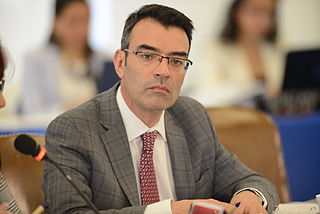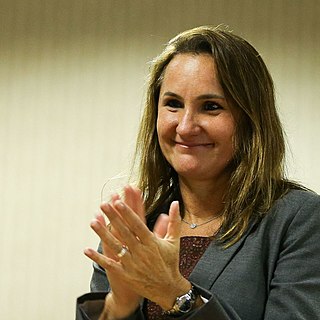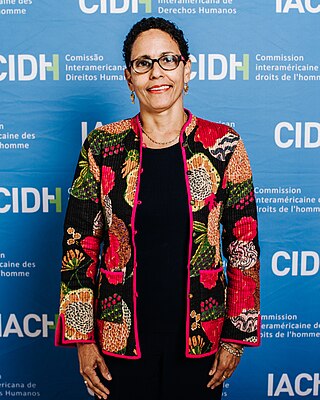International human rights law (IHRL) is the body of international law designed to promote human rights on social, regional, and domestic levels. As a form of international law, international human rights law is primarily made up of treaties, agreements between sovereign states intended to have binding legal effect between the parties that have agreed to them; and customary international law. Other international human rights instruments, while not legally binding, contribute to the implementation, understanding and development of international human rights law and have been recognized as a source of political obligation.
The Inter-American Commission on Human Rights is an autonomous organ of the Organization of American States (OAS).

The Inter-American Court of Human Rights is an international court based in San José, Costa Rica. Together with the Inter-American Commission on Human Rights, it was formed by the American Convention on Human Rights, a human rights treaty ratified by members of the Organization of American States (OAS).
The office of the Special Rapporteur on Freedom of Expression of the Organization of American States (OAS) was established by the Inter-American Commission on Human Rights (IACHR) in 1997 to monitor OAS member states' compliance with the American Convention on Human Rights in the area of freedom of expression.

Lesbian, gay, bisexual, and transgender (LGBT) people in Paraguay face legal challenges not experienced by non-LGBT residents. Both male and female types of same-sex sexual activity are legal in Paraguay, but same-sex couples and households headed by same-sex couples are not eligible for all of the same legal protections available to opposite-sex married couples. Paraguay remains one of the few conservative countries in South America regarding LGBT rights.

James (Jim) Cavallaro is a professor of law and the co-founder and executive director of the University Network for Human Rights. He teaches human rights at Wesleyan University, where he is a director of the Minor in Human Rights Advocacy, as well as the Wesleyan ACTS for Human Rights program. In addition to Wesleyan, Cavallaro frequently teaches at Yale Law School, and the University of California at Los Angeles (UCLA). He also teaches at Columbia Law School and the University of California Berkeley. Prior to launching the University Network, Cavallaro founded the International Human Rights and Conflict Resolution Clinic at the Mills Legal Clinic at Stanford Law School, United States. In 2018, Cavallaro and Ruhan Nagra founded the University Network for Human Rights, an organization that engages undergraduates and graduate students and their universities in human rights work in the United States and around the world. Cavallaro served as a commissioner (2014-2017) and President (2016-2017) of the Inter-American Commission on Human Rights. Cavallaro received his BA from Harvard University and his JD from University of California at Berkeley School of Law, where he served on the California Law Review and graduated with Order of the Coif honors. He also holds a doctorate in human rights and development from Pablo de Olavide University, Seville, Spain.

Catalina Botero Marino is a Colombian attorney who served as the Special Rapporteur for Freedom of Expression for the Inter-American Commission on Human Rights (IACHR) from 2008 to 2014. From 2016 to 2020, she was the Dean of the Law School of the University of Los Andes (Colombia). Since 2020 she is one of four co-chairs of Facebook's Oversight Board, a body that adjudicates Facebook's content moderation decisions.
The Republic of Uruguay is located in South America, between Argentina, Brazil and the South Atlantic Ocean, with a population of 3,332,972. Uruguay gained independence and sovereignty from Spain in 1828 and has full control over its internal and external affairs. From 1973 to 1985 Uruguay was governed by a civil-military dictatorship which committed numerous human rights abuses.

Tracy S. Robinson is Jamaican attorney and lecturer in the Faculty of Law at the University of the West Indies (UWI). She served as commissioner on the Inter-American Commission on Human Rights (IACHR) from 2012 to 2015 and in 2014 was elected as chair of the organization. She has served as the Rapporteur on the Rights of Women since January 2012 for the Organization of American States (OAS) and helped establish the Rapporteurship on the rights of LGBTI, serving as its first Rapporteur.

Margarette May Macaulay is the Jamaican Commissioner and some time President of the Inter-American Commission on Human Rights (OAS).

Esmeralda Arosemena de Troitiño is a lawyer and Supreme Count judge. She is a Panamanian Commissioner of the Inter-American Commission on Human Rights (OAS). In 2019 she became President of that body.

Paulo Abrão is a Brazilian human rights expert, former government official and law professor. He served as Executive Secretary of the Inter-American Commission on Human Rights (IACHR) from 16 August 2016 to 15 August 2020. Abrão previously served as Executive Secretary of the Institute of Public Policies of Human Rights of MERCOSUR; President of the Amnesty Commission of Brazil; Secretary of Justice of Brazil; President of the National Committee for Refugees; and President of the National Committee against Trafficking in Persons.

Antonia Urrejola Noguera is a Chilean lawyer who served as Minister of Foreign Affairs from 11 March 2022 to 10 March 2023. She was previously elected by the Organization of American States (OAS) to serve from 2018 to 2021 as a commissioner of the Inter-American Commission on Human Rights (IACHR). In 2021 she became the President of the IACHR, leading the first all woman team of President and vice-presidents.

Flávia Piovesan is a Brazilian lawyer and human rights Commissioner. She was elected by the Organization of American States (OAS) to serve from 2018 to 2021 as a Commissioner of the Inter-American Commission on Human Rights (IACHR). In 2021 she was the 2nd vice-president of the IACHR as part of the first all woman team of President and vice-presidents.

Julissa Mantilla Falcón is a Peruvian Rapporteur on the Rights of Older Persons for OAS. She was elected by the Organization of American States (OAS) to serve from 2020 to 2023 as a Commissioner of the Inter-American Commission on Human Rights (IACHR). In 2021 she was the first vice-president of the IACHR as part of the first all woman team of President and vice-presidents.

Felipe González Morales is a Chilean lawyer and academic, specializing in international human rights law. He was a commissioner of the Inter-American Commission on Human Rights (IACHR) between 2008 and 2011, a body he chaired between 2010 and 2011 and where he served as rapporteur on migrants. In 2017, he was appointed as United Nations special rapporteur on the human rights of migrants, a position he held until 2023.

Soledad García Muñoz is a Spanish lawyer who in 2017 was elected as first Special Rapporteur on economic, social, culture, and environmental Rights serving on the Inter-American Commission on Human Rights.

Roberta Clarke is a Barbadian lawyer who has worked for UN Women. She was elected as a commissioner for the Inter-American Commission on Human Rights to serve for four years from 2022.

Andrea Pochak is an Argentine lawyer. She was elected to serve on the Inter-American Commission on Human Rights (IAHCR) from January 2024 through to the end of 2027 and to be the OAS's Rapporteur on Human Mobility.

Tania Reneaum Panszi is a Mexican human rights expert who served as the Executive Secretary of the Inter-American Commission on Human Rights (IACHR) from 2021.

















